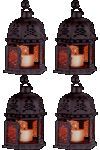
Thus, it is not here our purpose to present a lot of basic information. Such can be easily found by anyone with a fair degree of resourcefulness. These words are not intended to inform the public about our activities or opinions. They are to help draw together people who appreciate Thoth's work and want beneficial contact with Him. Our obligation to disseminate publicly is derived from a need to display a good degree of competence in handling rational concepts. Those who communicate privately will be able to obtain more substance from Thoth's studies, because His domain is tailored information. Surely, a square peg for a square hole and a round peg for a round one is the proper approach for advanced studies in any ethical system, even an arcane one.
The Gods do not encourage their servants to speculate overmuch in divine affairs, as there are so many other means of educating us. Intellectually gifted people exercise their talents by philosophizing, however, and this is one of the recreations that the priests of Thoth often sponsor. In demonstrating our abilities to be penetratingly clever, we may secure credibility and respect from those whose help we need. The most potent catalysts for increasing the level of perception in living souls are not rational, however.
Though extensive knowledge of the facts and theories of academic Egyptology can form a wonderful foundation for a priest or a priestess of Thoth, our greater goal is to develop the faculties of imagination and discernment. Auspiciously, wisdom can greatly benefit from exposure to the rare and elevated concepts that those who study Egypt cannot help but encounter. If you can gracefully handle a discussion of the recondite matters in which the Egyptians showed mastery, you might possibly do likewise with the funds that would build a temple. If you call yourself a priest of an Egyptian deity, you are proclaiming that you are sufficiently trustworthy to discharge real obligations in that deity's daily service, and often the most pressing of these involve changes on the material and emotional planes. Thoth's priests make their home in the mental world, but that world has its work on Earth. We become repositories of realized knowledge.
As initiates may act as prosecuting counsel for the Neteru, priests must often intercede and protect humans from the mighty forces in the cosmos that have a tendency to rear their heads at dangerous times. A priest's job is often to help someone get out of the doghouse with accidental karma, as long as that person demonstrates an adequate proclivity for self-correction. By the same token, a priest must often trim the fat, wash the laundry, and take out the trash, while initiates may have a more flexible program. Yet, the Lord's servant must possess the agility to escape from unreasonable pressures. If a baboon goes into an establishment displaying a sign that says, "Baboons Served", he must be able to discover quickly whether it means that he would be welcome at dinner or as dinner. He must preserve his reputation for being able to provide guidance, but still conserve his vitality for tasks natural to a shaman's constitution.












































